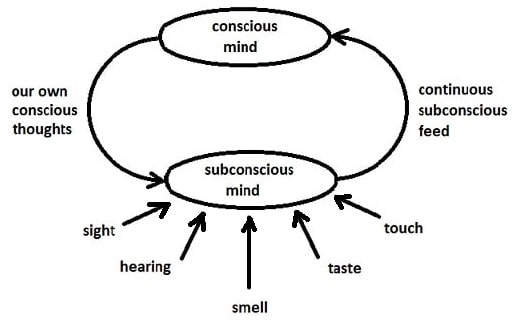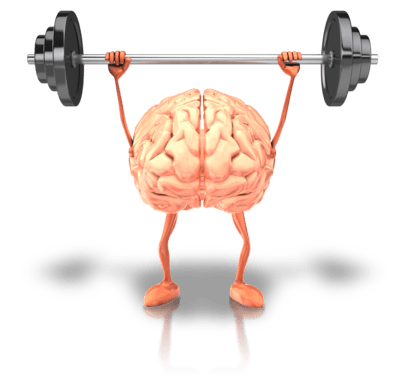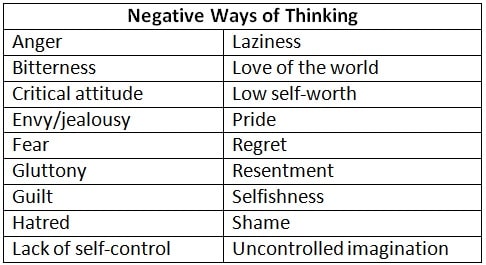Renewing the Mind
(Part 16 of the Cleansing of the Sanctuary Series)
“And be not conformed to this world: but be ye transformed by the renewing of your mind, that ye may prove what is that good, and acceptable, and perfect, will of God.” (Rom 12:2)
Scripture indicates that renewing the mind will renew or transform the life. To renew or change the mind requires changing what goes into it. Our behavior is driven by our most strongly-held beliefs. You have probably seen something like this:
- Your beliefs become your thoughts,
- Your thoughts become your words,
- Your words become your actions,
- Your actions become your habits,
- Your habits become your values,
- Your values become your destiny.
This suggests the order in which we need to start the process of renewing our minds.
Rewiring Your Brain to Renew Your Mind
Renewing or rewiring (which actually physically happens) your mind is kind of like the running faucet referred to earlier (Part 10) that fills the sink and then overflows onto the floor. We need to start at the source to effect what happens downstream.
What do we most and first need to change? That must be our beliefs, especially those about God – equivalent to the running faucet in the illustration. How do we change beliefs? It should be by the evidence presented to us which we then choose to either accept or reject.
For instance, you might attempt to establish a new habit (go for a brisk walk daily) in place of another (watching TV). If you struggle to do that, a more sure way would be to change your beliefs by looking seriously at the evidence of the benefits of exercise on health.
Internal and External Inputs
Our beliefs are influenced even by what we think about. Aside from input via our senses, a thought can come from our own subconscious. If you choose to consciously dwell on a thought, it will be reinforced in your subconscious and affect your beliefs. That is why positive affirmations work.

If you need to, it might be helpful to go back and review the distinction between the conscious and the subconscious mind in part 13.
The subconscious mind can remind us of things we have seen, heard, smelled, tasted and touched in the past. Thus, the conscious mind has both external (the 5 senses) and internal (the subconscious) data feeds. Of course, the content from the subconscious feed is entirely dependent on what previously went into the subconscious via the senses. Thus, the profound truth of the children’s song including these lyrics:
O be careful little eyes what you see
O be careful little ears what you hear
O be careful little tongue what you say
O be careful little hands what you do
O be careful little feet where you go
O be careful little heart whom you trust
O be careful little mind what you think
Will Power
Ultimately, everything depends on the right action of the will and a very key truth to remember is that God has given each of us a free will and He will NEVER interfere with it. God loves us dearly and wants us to love Him in return (more for our benefit than for His). Love cannot be forced. “Love me or else” just does not work; it never works.
The power of the will resides in the conscious mind. We always have the option of exercising our will to choose. And we can even make that a habit. Always make the right choice even in minor matters and it will become easier to choose what is right in more critical situations. You can strengthen your will power. Like any other exercise, train your brain to always choose the right option and it will become easier.

The Mind and the Flesh
In this part, we are looking especially at renewing the mind which is equivalent to cleansing the sinful flesh identified earlier as one of the three levels of sin:
- sinful attitude
- sinful flesh
- sinful acts
As discussed in part 14, rewiring of the brain circuits (in a negative way) happened very soon after the fall of mankind. Soon after everything in creation was pronounced to be “very good” (Gen 1:31) it was suddenly not so good.
Adam and Eve were changed from operating on love and trust to having minds subject to fear and selfishness, what is commonly called “survival-of-the fittest” and that, of course, affected many choices they made after that.
It is fear for self that leads to so many thoughts and actions in attempts to preserve and protect self. This leads to the “me-first,” selfish attitude that we all have which is so characteristic of the theory of evolution. Perhaps that is why it is so readily accepted – it matches our experience.
The Starting Point
There are many verses showing the condition of the human heart and how far it is from the original “very good.” This is where, after Adam and Eve, all of us start from.
“Behold, I was shapen in iniquity; and in sin did my mother conceive me.” (Psa 51:5)
The process of conception is not evil; the problem is the flesh we inherit that is defective.
“The heart is deceitful above all things, and desperately wicked: who can know it?” (Jer 17:9)
“For I know that in me (that is, in my flesh,) dwelleth no good thing: for to will is present with me; but how to perform that which is good I find not.” (Rom 7:18)
“That ye put off concerning the former conversation [conduct] the old man, which is corrupt according to the deceitful lusts;” (Eph 4:22)
Even when the heart (conscious mind) has the right attitude towards God, the flesh (subconscious mind) can need some adjustments, usually many of them. Think of the repentant thief on the cross. He (near the end of his life) changed His attitude towards God and that was enough for Him to receive the promise of salvation. But, had he somehow survived his crucifixion, he still would have been subject to the temptation to steal. He would have struggled with habitual tendencies which had developed in him over the years. This helps to show that what God most wants from us is our love and trust.
Desperately and Abundantly Wicked
Our brains, our ways of thinking (our sanctuaries) need to be cleansed of many things such as:

Are the items listed above sins? Well they are not primarily outward actions but they are very real. Often they are expressed outwardly, in many cases, via the mouth. People don’t like to hear their doctor say “it’s all in your head” but often much more of it is there than we would like to admit or that we even realize.
Wouldn’t you like to clean up and be able to cross off items you have from that list? Cleansing the sanctuary is more than dealing with words and actions. Stop for a moment and think of what life would be like if you had none of the traits listed above (or any other negative ways of thinking) in your experience. What would that be like? How would you feel? Perhaps even write down what that would be like. That is the cleansing, the renewing of the mind that God wants for us. What a change – from desperately wicked to life abundantly!
The thing is that those ways of thinking are affected by our basic beliefs and, much more than we realize, by our beliefs about God. In this section, we are looking at the general principle of renewing the mind. In a coming section, we will look at the specifics of some items on that list.
How to Want to Change
Many items listed above reflect our “me-first” thinking and our natural desire is actually not to give them up even though there is often a negative outcome. For example:
- With gluttony, the thinking is “I like the taste,” leading to overeating and resulting in poor health.
- With pride we might enjoy the feeling that we are better than others but scripture even tells us that “Pride cometh before a fall.” (Pro 16:18, paraphrased)
- Low self-worth leads to thoughts of “I can’t do it” and the easy road of procrastination which can lead to poor productivity.
- Love of the world produces the desire for more of life’s goodies which can mean a person is never satisfied.
We don’t want to get rid of those thinking patterns, but often know we should.
Why do we want or why would God want to cleanse us of these problems of the flesh? Are any of those ways of thinking good to have? No, certainly not. What is God’s desire for us?
“The thief cometh not, but for to steal, and to kill, and to destroy: I am come that they might have life, and that they might have it more abundantly.” (John 10:10)
To have some of the things in the list above still in our minds would not result in the abundant life. And, of course, those thoughts, as we saw earlier, lead to sinful actions. We tend to focus on the actions without thinking of where they come from. Dealing with the source will certainly help to clean up the results, the obvious sins. This is like getting to the root of the problem as in:
“And now also the axe is laid unto the root of the trees: therefore every tree which bringeth not forth good fruit is hewn down, and cast into the fire.” (Matt 3:10)
We need to get to the root of the problem and God has promised to help us do just that:
“For the LORD God is a sun and shield: the LORD will give grace and glory: no good thing will he withhold from them that walk uprightly.” (Psa 84:11)
“And God is able to make all grace abound toward you; that ye, always having all sufficiency in all things, may abound to every good work:” (2 Cor 9:8)
“Who gave himself for us, that he might redeem us from all iniquity, and purify unto himself a peculiar people, zealous of good works.” (Titus 2:14)
His aim is complete restoration, even to the uttermost:
“Wherefore he is able also to save them to the uttermost that come unto God by him, seeing he ever liveth to make intercession for them.” (Heb 7:25)
Being saved to the uttermost (or made completely whole) would be more than dealing with words and actions, it must also include the thoughts and intents of the heart:
“For the word of God is quick, and powerful, and sharper than any twoedged sword, piercing even to the dividing asunder of soul and spirit, and of the joints and marrow, and is a discerner of the thoughts and intents of the heart.” (Heb 4:12)
Having a thought is not sin. It is only when we dwell on questionable thoughts and choose to desire the wrong outcome, that they become, for example, lust. So thoughts can become sinful even with no outward act.
“But I say unto you, That whosoever looketh on a woman to lust after her hath committed adultery with her already in his heart.” (Matt 5:28)
You have to train your mind-muscle to rebuke those thoughts when they surface. Not simply out of fear that they will overtake you but because, just as when we don’t exercise our muscles, they will atrophy over time.
The object of all this is to have a cleansed heart, yes, but especially to have the clean or right concept of God. Hopefully, what we have shared already in this series and other information on this website is helping you with your concept of God’s character.
Specific ways to deal with the various forms of negative thinking will be examined soon in this series. Before that we want to see how we can become more aware of our specific problems.
This is Part 16 of the Cleansing of the Sanctuary Series
Return to Daniel 8:14 (master page of series) to continue
